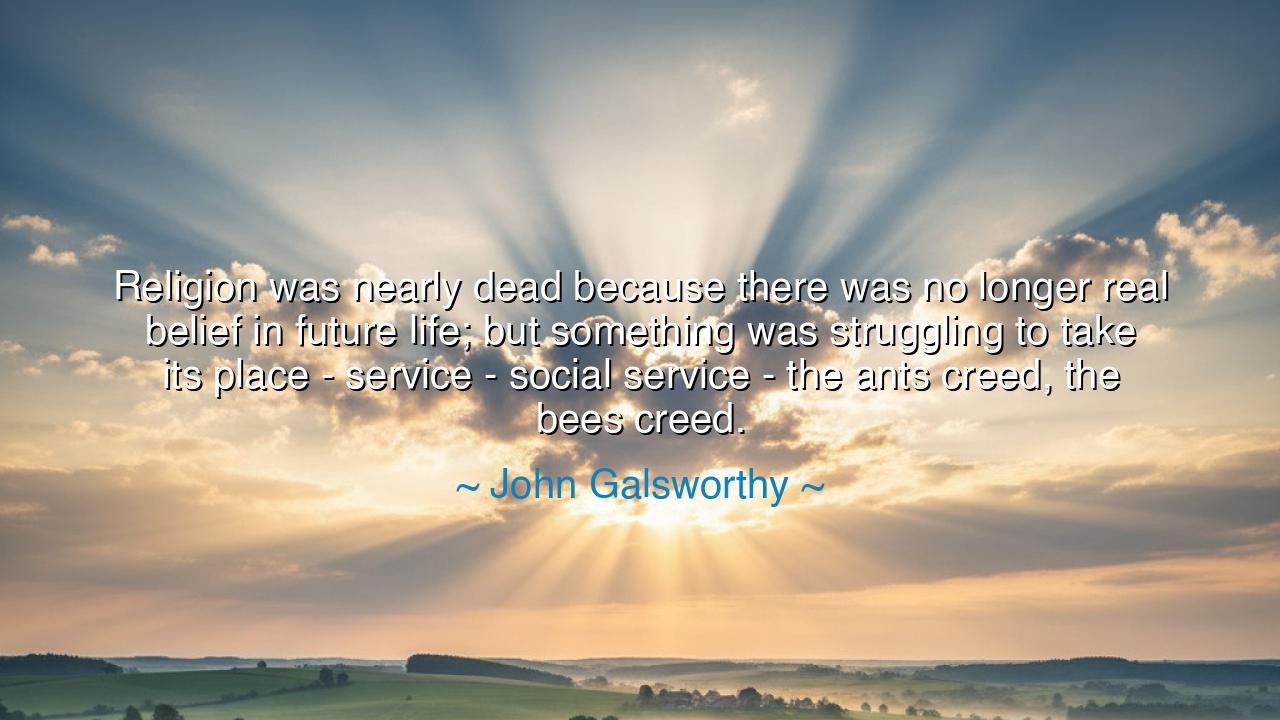
Religion was nearly dead because there was no longer real belief
Religion was nearly dead because there was no longer real belief in future life; but something was struggling to take its place - service - social service - the ants creed, the bees creed.






"Religion was nearly dead because there was no longer real belief in future life; but something was struggling to take its place - service - social service - the ants creed, the bees creed." – John Galsworthy. These words, spoken by the esteemed writer of social commentary, capture a profound shift in human thought and belief. In an age where faith in an afterlife was beginning to wane, Galsworthy recognized that humanity’s search for meaning was evolving. The traditional belief in religious salvation was being replaced by a new form of service—an impulse to serve the community and the greater good. In his observation, we see the ancient battle between individual purpose and collective service come to the forefront of modern consciousness.
In the world of the ancients, religion and spirituality were inseparable from daily life. The Greeks, with their polytheistic belief system, created gods that symbolized the forces of nature and human endeavors. These gods, such as Athena for wisdom and Apollo for the sun, governed not only the heavens but the moral and social actions of individuals. The ancient Egyptians, too, believed that the gods’ favor could only be won through the practice of virtue and service to both the divine and the people. Religion was the guide, the source of order for how people lived their lives, binding them together with a sense of a greater purpose. Yet, as Galsworthy points out, the decline of belief in an afterlife, and the growing rationalism of the modern age, led people to seek new meanings and new purposes that were not centered on divine salvation, but on the service to one another and the world itself.
In the shifting tides of history, we see how this change began to take root. Consider the story of the Industrial Revolution, a time of great technological advancement and immense societal upheaval. The rise of factories, cities, and new economies led many to question the relevance of old religious institutions, which often seemed disconnected from the daily struggles of the working class. As faith in the afterlife began to diminish, people started to place their focus on improving the conditions of life here and now, realizing that human progress could be achieved through collective effort. This was the birth of social service, a new creed that emphasized community and service to others as the central focus of moral life.
The creed of the ants and bees that Galsworthy mentions speaks to the innate drive to serve the collective good, a drive that transcends individual desires. In the animal kingdom, ants and bees are often seen as symbols of industriousness, working together in highly organized, efficient systems for the betterment of the colony. There is no focus on the individual’s legacy; rather, the collective effort of the colony is seen as the highest achievement. This, Galsworthy suggests, is what humanity was beginning to embrace—a move away from individual salvation and towards social service, where the well-being of the collective was held in the highest regard.
Throughout history, this evolution of thought can be seen in the lives of great social reformers, such as Florence Nightingale and Mahatma Gandhi. Nightingale, who is credited with founding modern nursing, chose to dedicate her life not to personal gain or glory, but to the service of humanity. Her work transformed healthcare and showed the world that the service of others is an act of the highest virtue. Similarly, Gandhi’s teachings were grounded not in religious doctrine, but in the service of the oppressed, the care of the poor, and the promotion of social justice. His creed was one of selfless action, where personal gain was secondary to the need to uplift others, embodying the social service Galsworthy describes.
In our own time, Galsworthy’s words remind us that the search for meaning and purpose is not always bound to religious dogma. Service to others, whether through charitable work, social activism, or simply caring for those around us, has become the new creed. The shift from religious belief to social service is not a loss, but an evolution. We are still driven by a deep need to connect, to contribute to something greater than ourselves, and to leave behind a legacy not of wealth or fame, but of good deeds and positive change.
Let us take this lesson to heart. In our own lives, let us turn our attention to the service of others—whether through small acts of kindness or through larger commitments to social causes. Just as the ants and bees serve their colonies, let us remember that we are part of a larger collective, and our lives gain meaning not from the accolades we receive, but from the good we bring to others. In the service of others, we find our greatest purpose, and in that purpose, we honor the timeless wisdom that Galsworthy’s words convey. Let our actions reflect not the search for personal salvation, but the unwavering commitment to the well-being of all.






AAdministratorAdministrator
Welcome, honored guests. Please leave a comment, we will respond soon